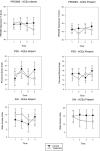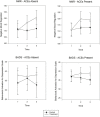Personalized Mobile Health-Enhanced Cognitive Behavioral Intervention for Maternal Distress: Examining the Moderating Role of Adverse Childhood Experiences
- PMID: 38263868
- PMCID: PMC10940253
- DOI: 10.7812/TPP/23.094
Personalized Mobile Health-Enhanced Cognitive Behavioral Intervention for Maternal Distress: Examining the Moderating Role of Adverse Childhood Experiences
Abstract
Background: Maternal history of trauma is a risk factor for distress during pregnancy. The purpose of this paper was to examine the theorized differential impact of a cognitive behavioral intervention (Mothers and Babies Personalized; MB-P) on maternal distress and emotional regulation for those with ≥ 1 adverse childhood experiences (ACEs; vs no ACEs) from pregnancy to 3 months postpartum.
Methods: Between August 2019 and August 2021, eligible pregnant individuals aged ≥ 18 years, < 22 weeks' gestation, and English-speaking were recruited from 6 university-affiliated prenatal clinics. Participants (N = 100) were randomized to MB-P (n = 49) or control (n = 51). Analyzable data were collected for 95 participants. Analyses tested progression of change (slope) and at individual timepoints (panel analysis) for perinatal mental health outcomes.
Results: The majority of participants (n = 68, 71%) reported experiencing > 1 ACE (median = 1, range: 0-11). Participants demonstrated significant differential effects for depressive symptoms in absence of ACEs (standardized mean differences [SMD] = 0.82; 95% confidence interval [CI] = [0.13-1.51]) vs in presence of ACEs (SMD = 0.39; 95% CI = [-0.20 to 0.97]) and perceived stress in absence of ACEs (SMD = 0.92; 95% CI = [0.23-1.62]) vs in presence of ACEs (SMD = -0.05; 95% CI = [-0.63 to 0.53]). A panel analysis showed significantly reduced depressive symptoms postintervention and increased negative mood regulation at 3 months postpartum for individuals with ACEs.
Conclusions: Findings support effectiveness of the MB-P intervention to reduce prenatal distress for all pregnant individuals. Preliminary exploration suggests the possibility that individuals with ACEs may benefit from enhanced trauma-informed content to optimize the effects of a perinatal intervention.
Keywords: adverse childhood experiences; emotional regulation; maternal distress; perinatal intervention; primary prevention; randomized controlled trial.
Conflict of interest statement
Conflict of InterestNone declared
Figures



Similar articles
-
"Echoes of a dark past" is a history of maternal childhood maltreatment a perinatal risk factor for pregnancy and postpartum trauma experiences? A longitudinal study.BMC Pregnancy Childbirth. 2023 May 29;23(1):397. doi: 10.1186/s12884-023-05714-2. BMC Pregnancy Childbirth. 2023. PMID: 37248446 Free PMC article.
-
Infant DNA methylation: an early indicator of intergenerational trauma?Early Hum Dev. 2022 Jan;164:105519. doi: 10.1016/j.earlhumdev.2021.105519. Epub 2021 Nov 29. Early Hum Dev. 2022. PMID: 34890904
-
Adverse childhood experiences, posttraumatic stress, and FKBP5 methylation patterns in postpartum women and their newborn infants.Psychoneuroendocrinology. 2020 Apr;114:104604. doi: 10.1016/j.psyneuen.2020.104604. Epub 2020 Feb 7. Psychoneuroendocrinology. 2020. PMID: 32109789 Free PMC article.
-
Maternal Adverse Childhood Experiences and Perinatal Anxiety, Obsessive Compulsive Disorder, Posttraumatic Stress Disorder, and Substance Use.WMJ. 2024;123(6):451-459. WMJ. 2024. PMID: 39908493 Review.
-
Perinatal depression: The role of maternal adverse childhood experiences and social support.J Affect Disord. 2020 Feb 15;263:576-581. doi: 10.1016/j.jad.2019.11.030. Epub 2019 Nov 10. J Affect Disord. 2020. PMID: 31759669 Review.
Cited by
-
A Pilot Randomized Controlled Trial of a Multimodal Wellness Intervention for Perinatal Mental Health.J Midwifery Womens Health. 2025 May-Jun;70(3):442-451. doi: 10.1111/jmwh.13754. Epub 2025 Apr 10. J Midwifery Womens Health. 2025. PMID: 40207735 Free PMC article. Clinical Trial.
References
-
- Brown H, Krogh-Jespersen S, Tandon D, Graham A, Mackiewicz Seghete K, Wakschlag L. Looking ahead: Pre- and perinatal interventions for maternal distress to prevent neurodevelopmental vulnerability. In: Wazana A, Székely E, Oberlander TF, eds. Prenatal Stress and Child Development. New York City, NY: Springer International Publishing; 2021:595–622. 10.1007/978-3-030-60159-1 - DOI
Publication types
MeSH terms
LinkOut - more resources
Full Text Sources
Miscellaneous

